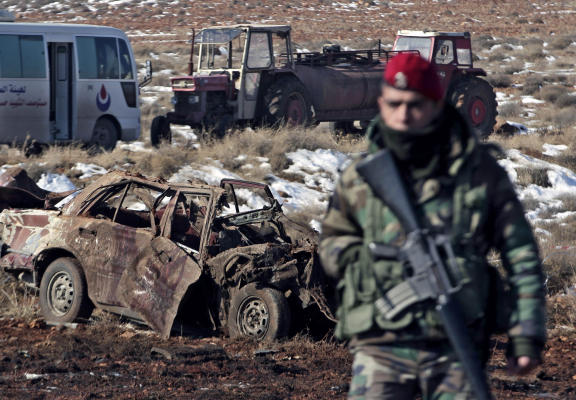
A Lebanese army soldier stands guard at the scene where a car bomb went off near a Hezbollah base near the Baalbek region, eastern Lebanon, early Tuesday, December 17, 2013. (AP Photo/Bilal Hussein)
Beirut, Asharq Al-Awsat—A Hezbollah checkpoint in east Lebanon was the target of a car bombing on Tuesday, the first incident of its kind in the Beqaa region, scene of a number of other recent attacks on targets associated with the organization.
The bombing was also followed by a rocket attack from Syria against the town Hermel, which is reported to have caused injuries among Lebanese soldiers and civilians.
A source told the AFP news agency said the car bomb explosion occurred near a Hezbollah staging area where its fighters usually gather before entering or returning from Syria.
AFP also quoted local residents saying that there is a Hezbollah observation point near the staging area, which is used to protect a larger base several hundred yards away.
A source with knowledge of the investigation into the attack told Asharq Al-Awsat that the explosion had caused “a number of injuries.”
The source also revealed that the military police and the forensics team had found evidence among the rubble suggesting that the base itself was the intended target.
This account clashes with initial reports broadcast by Hezbollah’s Al-Manar TV channel, which said that the vehicle detonated after it was spotted and engaged by Hezbollah fighters.
Al-Manar reported that “the car bomb was stopped a distance from the checkpoint, while Hezbollah forces approached the location. Then other Hezbollah forces opened fire after thinking they had fallen into an ambush.”
The explosion caused a three-meter crater, according to Al-Manar, which said that Hezbollah members wounded by the explosion were evacuated by their colleagues.
In comments to Asharq Al-Awsat, the source said it was not clear if the vehicle was driven by “a suicide bomber or . . . [if] the car was detonated remotely . . . this requires technical work and we must wait for the results of DNA tests.”
He added that the explosion was “very large with a power of 50 kilograms of TNT. Had it detonated in a residential area it would have caused extensive damage and dozens of deaths and injuries.”
According to the source, the military police and forensics teams found human remains scattered at the scene which had been processed along with other evidence at the request of the government commissioner at the military court, Judge Saqr Saqr, in order to perform DNA tests and ascertain the identities of the deceased.
Local eyewitnesses confirmed ambulances had rushed to the scene, while Al-Manar said casualties had been evacuated to hospital but denied there were any deaths. One eyewitness said “all that remains of the car that exploded is the engine—everything else has been scattered over a wide area.”
One security expert, retired Brigadier Amin Hatit, told Asharq Al-Awsat that bombings of this kind were likely the result of failures to spread widespread sectarian violence nationwide.
“The only remaining strategy is to launch rocket attacks at the Southern region and detonate car bombs,” he said. “This has become almost impossible thanks to the security net woven between the military and Hezbollah in Shi’ite areas.”
He revealed that “out of eight car bombs [sent to the region after earlier bombings in Banr Al-Eid and Ruweis], seven were intercepted and the eighth exploded near the Iranian embassy.”
In recent months a number of car bombs in Beirut and Beqaa have targeted Hezbollah targets. The first in Banr Al-Eid on July 9, and then in Ruweis on August 15 causing dozens of deaths and injuries. A suicide bomb attack on the Iranian embassy in Lebanon on November 19 caused the deaths of 23 people.
Additionally, on December 4, unknown gunmen assassinated prominent Hezbollah leader Hassan Al-Laqqis, shooting him outside his home.
Many residents view these attacks as repercussions of the conflict in Syria, where Hezbollah is fighting along with government forces.
According to Hatit, this has led to a shift in tactics by the bombers, who are now attempting to attack Hezbollah facilities directly, rather than carrying out indiscriminate bombings in Shi’ite districts.
Despite this shift, Hatit said he believes that Tuesday’s attack was a failure, “and demonstrated that [Hezbollah] has a potent security network and capabilities.”
On Tuesday evening six rockets launched from Syria fell on the city of Hermel in east Lebanon, injuring three people, including some Lebanese military personnel. The Lebanese army said that one of these fell on an army barracks in Al-Doura, injuring two soldiers and damaging property.
A group calling itself the Marwan Hadid Brigades claimed responsibility for the attack in a statement: “At 6:00 pm God allowed your brothers, the Marwan Hadid Brigades, the Brigades of the Valley, and the Commander of Qusair, to target the Labwa region with three rockets in response to this region participating with the Iranian Hezbollah in its battles on Syrian soil.”
